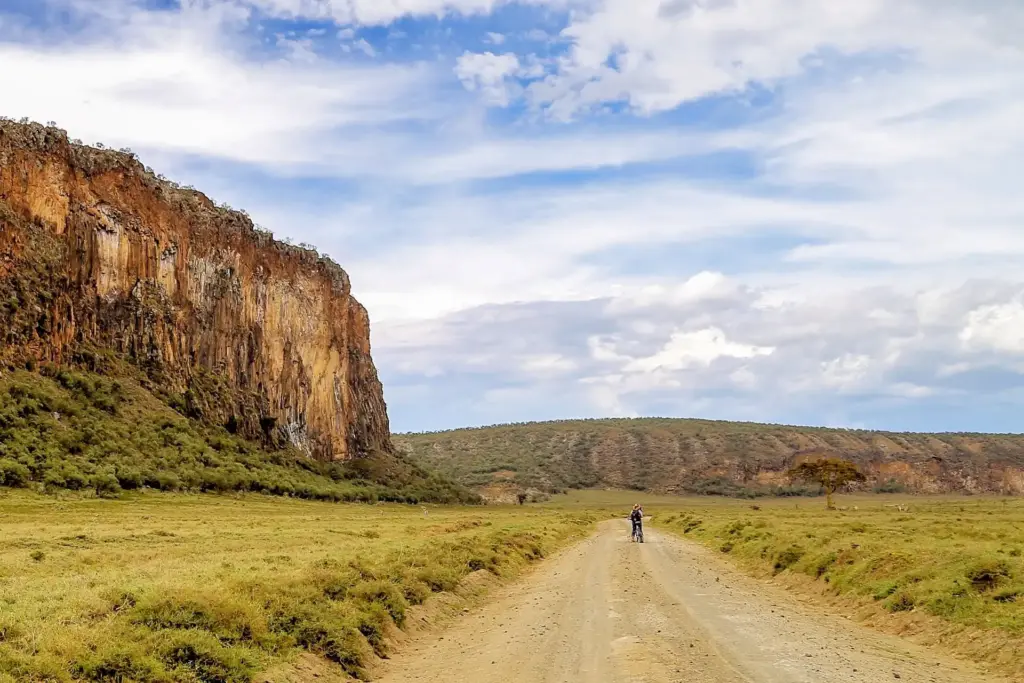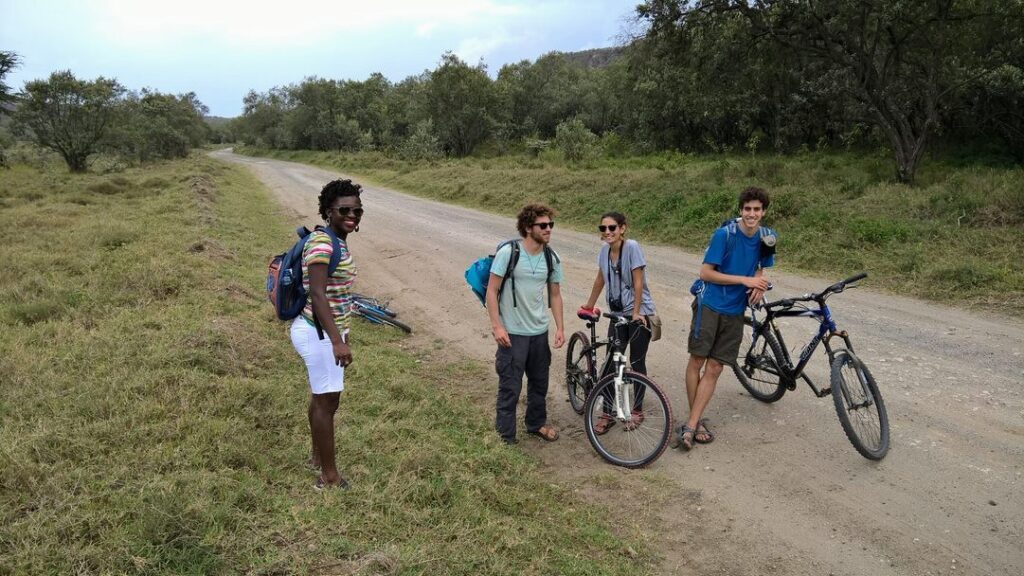The last time I was in Naivasha, Kenya, was a while back on a brief holiday. Naivasha is a beautiful town. The scenery in Nakuru county is spectacular, to put it mildly! While there, my sister and I took a trip to the nearby Hell’s Gate National Park. It’s about 14kms from the Sweet Lake Resort where we had checked in. The thrill in this is that you have the option of riding through the wild on a mountain bike. You could drive there if you like, but for the real adventurer, you want to be as close in proximity to nature (including the animals) as possible. I suppose excitement comes at the expense of safety! A great reminder of that fact is that while riding on the trail, my sis quite literally had a close brush with a large beast that nearly ran her over as it crossed the dirt road.

One of the main attractions at the park is the water-gouged gorges. They’re tucked away somewhere deep inside the park, though. So, depending on your pace, you’ll probably ride approximately 40 minutes to an hour before you arrive. On our way there, we make a number of pits stops to catch our breaths, appreciate the scenic surroundings and, like you guessed, take a few pictures for remembrance. It’s on one of these brief stops, halfway the journey, that we ran into a bunch of tourists. They’re heading back out of the game park. They’re quite friendly and seem eager to join us in our photo moment. After a few photos, we exchange pleasantries and inform them we’re from Uganda and, they—all three of them—say they’re from Israel. They’re in Kenya on holiday and will be returning home in a few days.

The conversation lasts a while before we finally say our goodbyes. That was the first time I ever had a physical interaction with Israelis. When it’s said that ‘first impressions last’, this is definitely the sort of thing they’re talking about, cos that episode certainly left a mark on me.
Since the event that sparked the current war between Israel and their mercurial neighbors, I’ve thought quite a lot about our acquaintances; often wondering if they’re okay. Did they even escape the horror of 7th October? Who knows!? Perhaps they’re caught up in the thick of battle at the warfront cos, you know, when you’re a small country like Israel is, with a small population literally surrounded by hostile neighbors that don’t acknowledge your right to exist, it’s easy to see why military service is compulsory for every able-bodied citizen above eighteen.
For four months now, the war has raged and is approaching its fifth cos, unfortunately or fortunately—depending on where you stand—the Israelis have a terrible habit of brutally pursuing their enemies to their last breath! So, it’s never over until it’s over! Even though the humanitarian situation, as it is in every war zone, is apparent, the long-standing tradition with every conflict of this magnitude has been that, more often than not, the biggest casualty is the truth. Exacerbated by the half-truths churned out in the media, it’s quite difficult to have a wholesome and accurate assessment of what’s actually transpiring on ground. In light of that, the world has been bitterly divided along political, social and religious lines. As such, the South Africans picked a side and decided to drag Israel to the International Court of Justice (ICJ).

The premise upon which South Africa made the application to the ICJ was what they termed as an ongoing genocide—real or perceived—in the Gaza strip. And so, they hoped for the court to institute an injunction on the Israelis’ ruthless battle against their enemies, perhaps even order a ceasefire. Technically, the same ‘genocide’ card could be played against their foes as well cos, according to the Convention on the Prevention and Punishment of the Crime of Genocide, the term genocide is defined, in part, as: any act committed with intent to destroy, in whole or in part, a national, ethnic, racial or religious group.
You’ll notice the epiphany when you realize the definition doesn’t even put a head count to the number of people that should be afflicted for it to qualify as genocide. That in itself effectively classifies the attack of 7th October 2023 as a genocide! Not to mention that nobody has demonstrated more intent to wholly destroy Israel than the enemies of Israel. They’ve done so repeatedly both in rhetoric and with actions to accompany their words, from as far back as 1948; despite the numerous olive branches that have been held out to them. It’s seems quite convenient that nobody wants to talk about this!
Notwithstanding, the 16 or so judges at the bench pronounced their ruling on the case. However, it wasn’t immediately clear who had come out triumphant as each party claimed victory. As it stands, the battle at the warfront is unrelenting.
Following the verdict, Justice Julia Sebutinde, the Ugandan lady, became the centre of attention as she, unlike her counterparts, vehemently ruled against the South Africans on virtually every count, much to the world’s astonishment. Whereas she clearly explained her position, a few people cared to respect the fact that she’s entitled to an independent opinion. She would soon become the subject of some vile attacks on different media platforms, directed at her person.

In order to be like Justice Julia Sebutinde, you’ve got to have the right brain matter for a role that’s as delicate as the one she has. Just to give a bit of context if it helps, Justice Julia is an alumni of Gayaza High School (GHS), an early 1900s missionary-founded girls’ school in Uganda. GHS is like the Affalterbach (Mercedes-AMG) of schools. For decades, they’ve been known to produce some of the country’s finest brains. Any additions after that level are just a bonus.
The ICJ is a meritocracy and demands that you possess an outstanding set of qualities and skills, in addition to demonstrating excellence in your field, before you’re considered for a position. Evidently, her CV attests to what she’s capable of. If it weren’t the case, she wouldn’t have been selected to be the first African female to sit at the ICJ. But for argument’s sake, let’s assume she cut corners on her way to the top: how about you also try it out and see where that gets you! The difference between Julia Sebutinde and the noisy keyboard judges of our day sitting behind their smartphones is that while she’s an actual real-life judge in a courtroom, they, on the other hand, are…well, keyboard judges!
Also, you must be thick skinned and fearless to be Sebutinde. It’s not often that you find almost the entire world jumping down your throat at once; but when they do, no matter the pressure, you stand your ground and take them on cos that’s the price you pay for being a person of character. In the end, you’ll still be a hero to some who recognize your worth. Fickleness is not a quality that gets you anywhere!
To be like Sebutinde, be on standby to get disowned by your own country even when it’s not them that appointed you to your position, or that your ruling had absolutely nothing to do with them. Forget the fact that your name plate at the courthouse says ‘Judge Julia Sebutinde’ and not ‘Judge of Uganda’.
Overall, it’s okay to disagree on the matter of principle. However, ad hominem attacks are churlish and backward. Ultimately, the world needs peace: the innocent Palestinian people in Gaza and the Israelis alike. Not war! Stand for peace; pray for peace!
Follow the conversation on X: